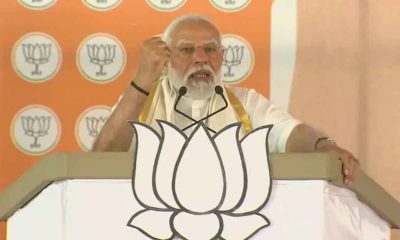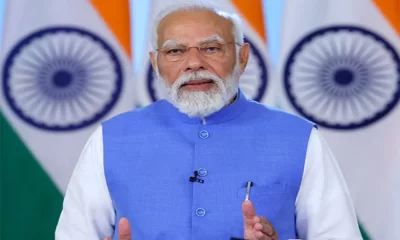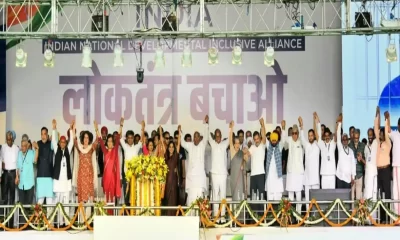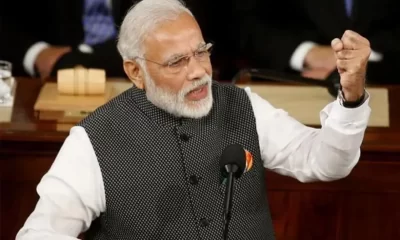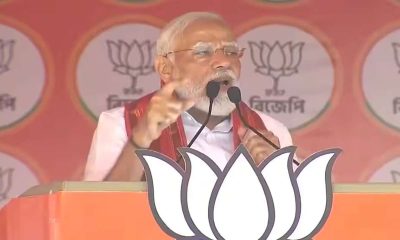Latest business news
Paytm eyes to create world’s largest digital bank with its Payments Bank
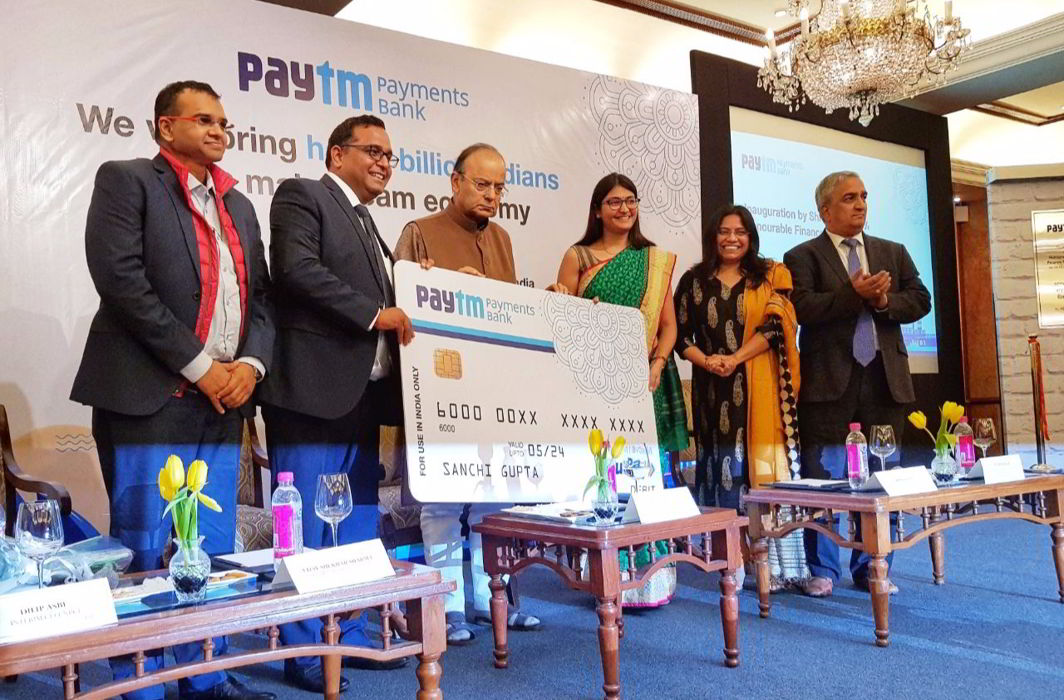
[vc_row][vc_column][vc_column_text]Paytm Payments Bank aims to bring 500 million Indians into ‘mainstream economy’, offers zero-balance account, free IMPS, NEFT, RTGS, UPI transactions
Digital transactions major Paytm, on Tuesday, launched the Paytm Payments Bank – India’s first ‘mobile bank’ – and claimed that it hopes to become the world’s largest digital bank with at least 500 million accounts by 2020. The online financial service provider also announced a slew of lucrative offers for customers who wish to transact through the Paytm Payments Bank.
The country’s first digital bank was inaugurated by Union finance minister Arun Jaitley inaugurated at an event in Delhi. Paytm, which has seen an unprecedented surge in its business and the personal fortunes of its founder, Vijay Shekhar Sharma, ever since Prime Minister Narendra Modi stunned the nation with his demonetisation move last year and forced Indians to switch to a digital, cashless economy, has claimed that its motto now is to build a new business model in the banking sector.[/vc_column_text][/vc_column][/vc_row][vc_row][vc_column][vc_raw_html]JTNDYmxvY2txdW90ZSUyMGNsYXNzJTNEJTIydHdpdHRlci10d2VldCUyMiUyMGRhdGEtbGFuZyUzRCUyMmVuJTIyJTNFJTNDcCUyMGxhbmclM0QlMjJlbiUyMiUyMGRpciUzRCUyMmx0ciUyMiUzRSUyNnF1b3QlM0JJdCUyNiUyMzM5JTNCcyUyMGElMjBuZXclMjBjaGFwdGVyJTIwaW4lMjBoaXN0b3J5JTIwYmVpbmclMjB3cml0dGVuJTI2cXVvdCUzQiUyMC0lMjBIb24lMjYlMjMzOSUzQmJsZSUyMEZpbmFuY2UlMjBNaW5pc3RlciUyMFNocmklMjBBcnVuJTIwSmFpdGxleSUyMHdpc2hlcyUyMHRoZSUyMGJlc3QlMjB0byUyMCUzQ2ElMjBocmVmJTNEJTIyaHR0cHMlM0ElMkYlMkZ0d2l0dGVyLmNvbSUyRnZpamF5c2hla2hhciUzRnJlZl9zcmMlM0R0d3NyYyUyNTVFdGZ3JTIyJTNFJTQwdmlqYXlzaGVraGFyJTNDJTJGYSUzRSUyMCUyNmFtcCUzQiUyMFRlYW0lMjAlM0NhJTIwaHJlZiUzRCUyMmh0dHBzJTNBJTJGJTJGdHdpdHRlci5jb20lMkZQYXl0bUJhbmslM0ZyZWZfc3JjJTNEdHdzcmMlMjU1RXRmdyUyMiUzRSU0MFBheXRtQmFuayUzQyUyRmElM0UlMjBmb3IlMjB0aGlzJTIwbmV3JTIwZW5kZWF2b3IuJTIwJTNDYSUyMGhyZWYlM0QlMjJodHRwcyUzQSUyRiUyRnQuY28lMkZpVDNGSDRwU3F6JTIyJTNFcGljLnR3aXR0ZXIuY29tJTJGaVQzRkg0cFNxeiUzQyUyRmElM0UlM0MlMkZwJTNFJTI2bWRhc2glM0IlMjBQYXl0bSUyMFBheW1lbnRzJTIwQmFuayUyMCUyOCU0MFBheXRtQmFuayUyOSUyMCUzQ2ElMjBocmVmJTNEJTIyaHR0cHMlM0ElMkYlMkZ0d2l0dGVyLmNvbSUyRlBheXRtQmFuayUyRnN0YXR1cyUyRjkzNTQ2NjEyNTUxMjU4NTIxNyUzRnJlZl9zcmMlM0R0d3NyYyUyNTVFdGZ3JTIyJTNFTm92ZW1iZXIlMjAyOCUyQyUyMDIwMTclM0MlMkZhJTNFJTNDJTJGYmxvY2txdW90ZSUzRSUwQSUzQ3NjcmlwdCUyMGFzeW5jJTIwc3JjJTNEJTIyaHR0cHMlM0ElMkYlMkZwbGF0Zm9ybS50d2l0dGVyLmNvbSUyRndpZGdldHMuanMlMjIlMjBjaGFyc2V0JTNEJTIydXRmLTglMjIlM0UlM0MlMkZzY3JpcHQlM0U=[/vc_raw_html][/vc_column][/vc_row][vc_row][vc_column][vc_column_text]After the launch of the online banking service, Paytm founder and CEO Vijay Shekhar Sharma said, “We are unveiling our money market fund, launching our debit card and we’ll have the capabilities to allow enterprises to open business accounts. Digital payments was our entry point, we want to become a vertically-integrated financial services company.”
Speaking about Paytm’s goal of achieving 500 million Indian customers within two years, Sharma said: “It’s a moon shot target. It’s not worth aiming something lesser than that and I do believe that the number of resources and investments and the team that we are chasing we should be able to achieve 500 million customers for our Paytm Payments Bank.”
To help its customers in being eligible to access a Paytm Payments Bank account, Paytm is planning to invest around USD 500 million in KYC (Know Your Customer) – and is also planning to set up KYC centers across the country.
Paytm will, predictably, be supported by the government’s financial technology with incentives, initiatives like digital lockers and user authentication based on Aadhaar numbers.
Paytm Payments Banks, besides its offer of zero charges on all online transactions and no minimum balance requirement, will also provide free RuPay digital debit card to every new account holder.
The Paytm CEO said: “India is at a cusp of a financial revolution and demography & access to financial services will create a ton of jobs in the country and Paytm is very proud to be a part of this financial services revolution.”
While Sharma owns the majority share of the digital Payment’s bank, One97 Communications – which is backed by the Alibaba Group Holding Ltd and Jack Ma’s Ant Financial – holds the remaining 49 percent of the share. The new digital bank is made with the company’s revenue from its digital wallet – which clinched over hundred million customers after Narendra Modi-led Central government put a ban on the currency notes of higher denominations.
“We will launch share trading and insurance products very soon. We want to become an internet-age financial services company. Buying insurance and investing through our wealth management products will become widely accessible through the payments bank,” said Sharma.
Key features of the Paytm Payments Bank are:
a)Quick and paperless account opening
b)No extra charges of IMPS, NEFT, RTGS, or UPI
c)Free RuPay digital debit card on opening an account
d)Personalized banking at more than 1,00,000 Paytm ka ATM locations[/vc_column_text][/vc_column][/vc_row]
Latest business news
Google restores delisted Indian apps after government intervention
Google on Saturday restored all Indian apps it had removed.

Google has started to restore all the delisted Indian mobile apps on Play Store agian, which they had removed due to a disagreement over service fees. After a discussion between company representatives and IT Minister Ashwini Vaishnaw, the decision was made, according to sources.
The step was taken in response to Vaishnaw’s strong statement in which he said that it is not allowed for apps to be removed from the Google Play Store. The minister had said, India is very clear, our policy is very clear…our startups will get the protection that they need.
Vaishnaw continued saying that he has already given Google a call. They will be speaking with the app developers who were delisted this week. This is not acceptable. The minister said this kind of delisting cannot be permitted.
Ten Indian companies’ apps were banned by Google on Friday, causing outrage in one of its fastest-growing markets. With 94% of phones running on its Android platform, Google holds a large portion of the Indian market. Popular names like Naukri and Bharatmatrimony were on the list.
The main point of contention is Google’s in-app purchase fees, which range from 11% to 26%. Indian startups have long opposed the US tech giant’s actions, believing them to be unfair.
The founder of Bharat Matrimony, Christian Matrimony, Muslim Matrimony, and Jodii, Matrimony.com, expressed shock at the matchmaking apps’ removal from the Google Play Store.
Shaadi. Com CEO Anupam Mittal described it as a dark day for India’s internet, highlighting the possible broad effects on matchmaking services. He also called Google an evil.
While, Kuku FM Co-founder Vinod Kumar Meena in a statement had said that Google was behaving like a monopoly.
Meanwhile, Google temporarily withdrew the famous Indian payments app Paytm from the Play Store in 2020, claiming a few policy infractions. Due to this decision, the founder of the company as well as the larger startup community came together to build their own app stores and file lawsuits against Google.
Latest business news
Anant Ambani says he is 100% lucky to get Radhika Merchant in his life
Anant Ambani said he was grateful to get Radhika as his life partner. He said he is 100% lucky to get Radhika Merchant in his life. He said every day he is falling more and more in love with her. He added although he had known Radhika for the last 7 years, it felt he had met her only yesterday. He thanked Radhika for everything.

Anant Ambani and Radhika Merchant’s grand three-day wedding celebrations began with a glamorous cocktail night on Friday in Jamnagar. During the celebrations, Anant Ambani also gave a speech wherein he thanked his late grandfather Dhirubhai Ambani and grandmother Kokilaben Ambani for inspiring him. Anant Ambani said he was grateful to get Radhika as his life partner. He said he is 100% lucky to get Radhika Merchant in his life. He said every day he is falling more and more in love with her.
He expressed his gratitude to his mother for pulling together the lavish three-day wedding celebrations in Jamnagar. Anant thanked his mother for all she had done. He said all the arrangements had been done by his mother and nobody else. He added his mother had gone all out and she had worked 18-19 hours a day and he was extremely grateful to her.
He also thanked all the guests who were present there at the pre-wedding celebrations. He said everyone had made it to Jamnagar to make him and Radhika feel special. He said both of them were honored and humbled to have all of them present there. Anant said he was sorry if they had caused an inconvenience to anyone. He asked for forgiveness. He hoped everyone is going to enjoy the coming three days. He also thanked his mother, father, sister, brother, his sister-law and his brother in-law for making this event memorable.
Anant said everyone has been sleeping for less than 3 hours a day for the last 2-3 months and he was very happy to share this joy with everyone. The youngest Ambani talked about his personal struggles and how his parents had always supported him. He further added his life had not been entirely a bed of roses. He said he had also experienced the pain of thorns. He said he had faced many health crises.
Latest business news
Facebook chief Mark Zuckerberg shares pictures from 2nd day of Anant Ambani and Radhika Merchant pre-wedding celebrations
Zuckerberg shared pictures from the 2nd day of Anant Ambani and Radhika Merchant’s pre-wedding celebrations. In the photograph Mark Zuckerberg can be seen along with his wife Priscilla Chan. The couple is exuding happiness as they prepare for the event. He captioned the picture it is getting wild out here.
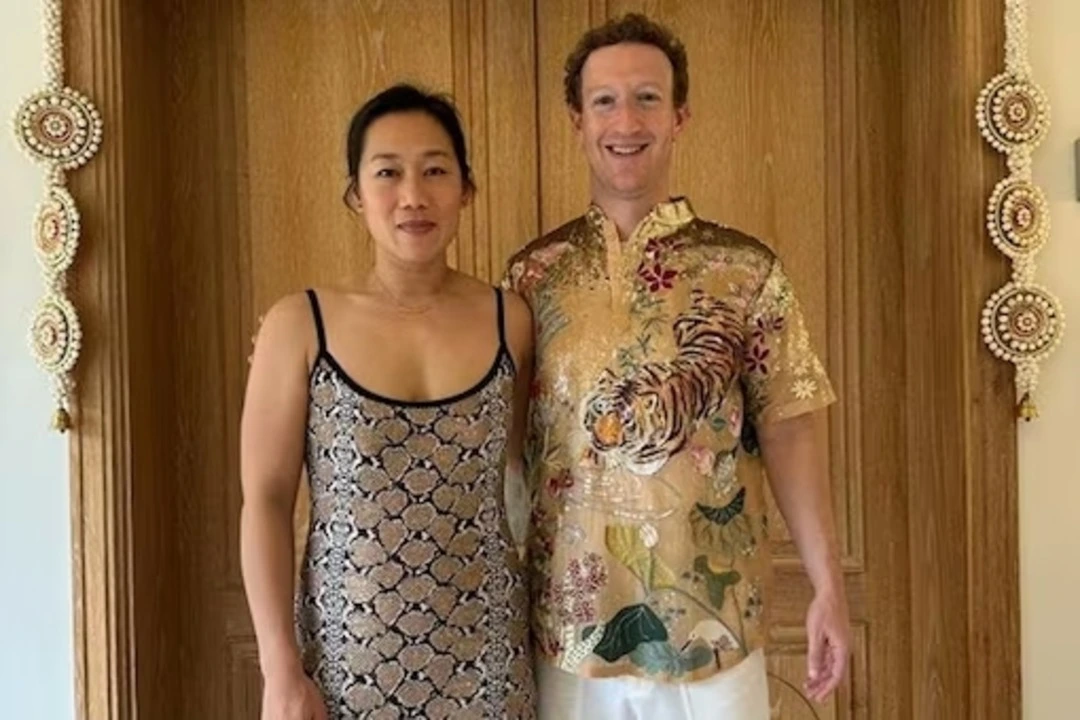
Facebook boss Mark Zuckerberg and wife Priscilla Chan joined the star- studded pre-wedding celebrations of Anant Ambani and Radhika Merchant in Jamnagar on Friday. The event was attended by many prominent figures from different fields. Zuckerberg took to his Instagram handle congratulated the couple and said he loved Indian weddings.
Zuckerberg shared pictures from the 2nd day of Anant Ambani and Radhika Merchant’s pre-wedding celebrations. In the photograph Mark Zuckerberg can be seen along with his wife Priscilla Chan. The couple is exuding happiness as they prepare for the event. He captioned the picture it is getting wild out here.
The theme of the opening day of the pre-wedding celebrations was Evening in Everland as the guests wore cocktail attire. The first day of the grand celebrations elevated the expectations of the guests for the following days. The theme of the 2nd day of the pre-wedding bash is known as a Walk on the Wildside and the guests can be seen in Jungle Fever attire.
Zuckerberg has opted for an animal print shirt with white trousers, Chan is complementing his look in a strappy one piece in black and golden. The Jungle theme is aligned to Vantara, Reliance’s animal welfare initiative undertaken and launched by Anant Ambani a few days back.
International pop star Rihana electrified the pre wedding celebrations on Friday with an amazing performance, marking her debut appearance in India. The chart topping artist engaged the audience with performances of her iconic hits which included Pour it Up, Work and Diamonds.
Zuckerberg graced the opening day, wearing a black-on-black firefly blazer and shoes from Alexander McQueen while his wife Priscilla wore a black gown with gold flower details and other accessories such as dainty chain bracelet, gold necklace and stud earrings. Mark Zuckerberg and wife Priscilla Chan are one of the Power couples invited from the global business community for the festivities currently underway at Jamnagar.
-
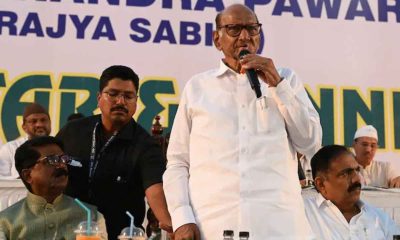
 2024 Lok Sabha Elections10 hours ago
2024 Lok Sabha Elections10 hours agoNCP (SP) leader Sharad Pawar says Prime Minister Narendra Modi is trying to create fear like Russian President Vladimir Putin
-

 Cricket news12 hours ago
Cricket news12 hours agoIPL 2024: Yashasvi Jaiswal hits brilliant century to help Rajasthan Royals beat Mumbai Indians by 9 wickets
-
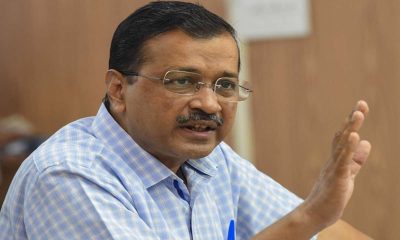
 India News12 hours ago
India News12 hours agoArvind Kejriwal given insulin in Tihar jail after sugar levels touch 320
-

 Entertainment10 hours ago
Entertainment10 hours agoMithun Chakraborty, Usha Uthup honoured with Padma Bhushan
-

 India News11 hours ago
India News11 hours agoSalman Khan house firing case: Mumbai crime branch recovers gun, cartridges from Tapi River in Surat
-
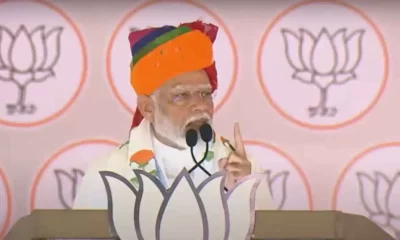
 2024 Lok Sabha Elections9 hours ago
2024 Lok Sabha Elections9 hours agoPrime Minister Narendra Modi says listening to Hanuman Chalisa under Congress rule is a crime
-

 Entertainment8 hours ago
Entertainment8 hours agoFan jumps on stage and hugs Atif Aslam during concert, video goes viral
-
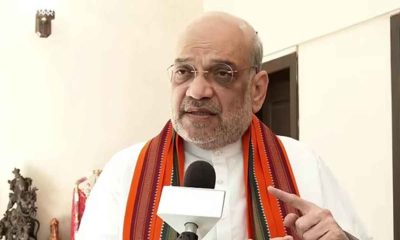
 2024 Lok Sabha Elections6 hours ago
2024 Lok Sabha Elections6 hours agoAmit Shah says neither Congress nor Trinamool chief Mamata Banerjee can interfere with CAA

